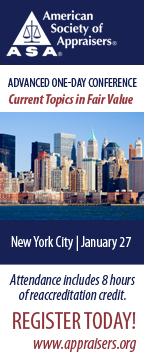
| January 18, 2012 | Issue #112-3 |
BV leaders to appraisers: sink or specialize Following up on our year-end survey, in which the majority of respondents recognized a major trend toward specialization in the BV profession, we asked members of the BVU Editorial Advisory Board whether they agreed that the era of the BV “generalist” was indeed over:
Develop an education plan. Specialization is not just about marketing to a particular industry, Fannon says; “it’s a matter of getting an education plan together.” For her suggested reading list—plus numerous tips from all the top BV leaders on how to specialize in the current economy, check out the complete article in the February 2012 Business Valuation Update.
In the wake of the recent financial crisis, current securities fraud litigation focuses on whether shareholders can show that a company’s failure to write down impaired assets caused the loss of share value. Under tightening federal standards, the complaint may not survive a motion to dismiss if the plaintiffs fail to enlist a financial expert to help them evaluate and apply certain fair value accounting concepts in the initial allegations. Consider the following excerpts from recent federal cases, available at BVLaw:
Are you ready to educate courts, clients? Join Mark Zyla (Acuitas, Inc.) on January 26 for Goodwill Impairment: Qualitative Assessments & the FinREC Exposure Draft. Zyla, a member of the AICPA task force that just released the working draft of the Accounting and Valuation Guide, Testing Goodwill for Impairment, will discuss the contents of the exposure draft, its current feedback and comment process, plus answer your questions regarding the new qualitative “machinery” of goodwill assessments. Cross-examination based on draft reports is an ‘uninformative exercise,’ says new guidance from DE Chancery Just last week the Delaware Court of Chancery published a new set of practice guidelines to help lawyers and their experts. The non-binding guidelines “are not intended to be used as a sword to wound adversaries,” the court advises. “To the contrary, they are intended to reduce conflicts among counsel and parties over non-merits issues, and allow them to more efficiently and less contentiously handle their disputes in this court.” In a section devoted to expert reports, the court recommends that experts:
The court also prefers that parties “stipulate to limit expert written discovery to the final report and materials relied on or considered by the expert.” Although the court “understands the degree of involvement counsel typically has in preparing expert reports,” it says that “cross-examination based on changes in drafts is usually an uninformative exercise.” Finally, the court will typically require the parties to identify their expert witnesses and the topics of their testimony in a scheduling order, along with the timing for submitting expert reports. The complete 18-page guidelines are available here. Pepperdine partners with Dun & Bradstreet, offers new certificate in private capital markets Pepperdine University's Private Capital Markets Project (PPCMP) and the Graziadio School of Business and Management have just partnered with Dun & Bradstreet Credibility Corp. to develop research on the national economy as well as private capital access for small and medium sized businesses, according to a news release. In just a couple of weeks, the partnership plans to publish a national annual economic forecast, based on continuing research by Dr. John K. Paglia (PPCMP and the Graziadio School). After that, it will create a new, monthly Private Capital Access (PCA) Index, designed to measure the health and activity of private capital markets. "We expect to give small and medium size business owners … an opportunity to share their challenges and successes in finding capital from a variety of sources and then benefit from the aggregate data," Paglia says. Also new from Pepperdine and Paglia: the Certificate in Private Capital markets, a three-day curriculum-based training program centered on PPCMP research. The next offering is April 18-20 in Malibu, Calif.; for more information, click here. Paglia & Slee up for M&A award. To cap off his busy year, Paglia—along with Robert Slee(Robertson & Foley)—are among the five finalists for the third annual Middle Market Thought Leader Award. The award, given by The Alliance of Merger & Acquisition Advisors and Grant Thornton, honors “individuals who have made a meaningful contribution to middle market M&A,” says a recent release, which also names the remaining three nominees. Daubert challenger reaps $4.7M in attorney/expert fees Current U.S. patent law permits courts to award attorneys’ fees upon a finding of “exceptional litigation misconduct.” Although the statute doesn’t expressly provide for an award of expert witness fees, a judge’s “inherent authority” may. That is according to a new decision from the Federal Circuit, which upheld an award of $3.9 million in legal fees and $800,000 in expert witness fees for the defendant in a patent suit. “Although we agree … that exclusion of expert testimony under Daubert does not automatically trigger a finding of litigation misconduct,” the court said, “we find that the circumstances of this case were sufficiently egregious,” including the defendant’s having to incur substantial expense in rebutting “untested” and unreliable expert evidence. A warning to BV experts? Although the case doesn’t concern a financial expert or evidence, it suggests that “vulnerability to a Daubert challenge can be a problem for the client as well as the expert,” says Dr. Robert Comment, in a follow-up to his BVR webinar last week on the admissibility of DLOM methods under the federal standards. Ultimately, the issue may come down to whether “general acceptance can suffice for admissibility when reliability is otherwise questionable, as I claim is the situation with large DLOMs,” Comment says. “I believe that many [analysts] in the BV community hold a dangerously inflated opinion of the prophylactic value of ‘general acceptance.’” 2011 M&A reports show ‘knowledge industry’ leading the surge Berkery Noyes investment banking firm just published its most recent reports on 2011 mergers and acquisitions, broken down by key sectors of the “knowledge industry”:
If healthcare is your specialty . . . . . . then you’ll want to attend BVR’s 2012 Online Symposium on Healthcare Valuation, a monthly series that starts on January 24 with Economic & Regulatory Update in Healthcare Valuation, featuring Mark Dietrich, editor of the AHLA/BVR Guide to Healthcare Valuation and mastermind behind the Symposium series. In this 100-minute presentation, Dietrich will address how the current economy, new regulation, and pending reform proposals will impact healthcare valuations, now and in the near future. Subscribers to the entire 12-month Symposium series will receive up to 24 CPE credits as well as access to the Healthcare Desktop Learning Center, an online, multimedia library of all BVR healthcare programs since 2004, including the entire 2011 Symposium. For more information, click here. FASB posts new monthly summary of activities Recognizing that financial statement users (and busy valuation specialists) may not “have the time to read and respond to detailed technical proposals,” the FASB has just released its first summary Update for 2012. Highlights include:
Fair value conferences on both coasts To keep up with current updates and perspectives on financial reporting, don’t miss the ASA’s Current Topics in Fair Value, an advanced one-day conference on Friday, January 27 in New York City. Topics include control premiums, impairment testing, valuing customer relationships, and more news & views from the PCAOB and the Big Four auditing firms. Check out the complete agenda here. If you can’t make it to the East Coast, consider the 2012 Congress on Fair Value, co-hosted by NACVA and the Consultants’ Training Institute for two days, February 27-28, in Seattle.
To ensure this email is delivered to your inbox, please add editor@bvwire.com to your e-mail address book. We respect your online time and privacy and pledge not to abuse this medium. To unsubscribe to BVWire™ reply to this e-mail with 'REMOVE BVWire' in the subject line or use the link below. This email was sent to %%emailaddress%% Copyright © 2012 by Business Valuation Resources, LLC |
|



